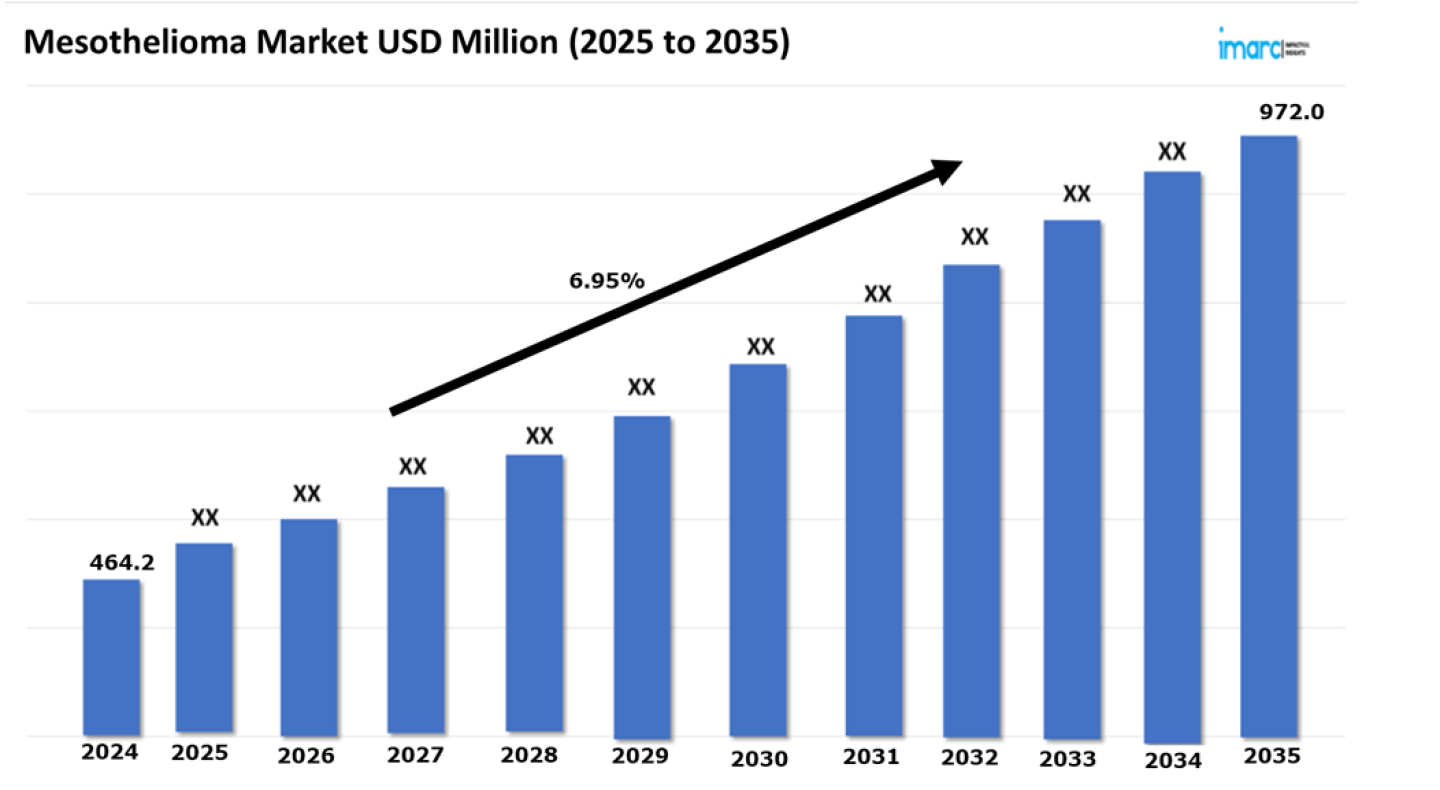Mesothelioma Market Outlook 2025-2035:
The mesothelioma market reached a value of USD 464.2 Million in 2024. Looking forward, IMARC Group expects the 7MM to reach USD 972.0 Million by 2035, exhibiting a growth rate (CAGR) of 6.95% during 2025-2035. The treatment landscape for mesothelioma is experiencing a significant transformation, shifting from primarily palliative care to a focus on innovative, targeted therapies aimed at combatting the disease at its core. This evolution is fuelled by a rapidly increasing understanding of mesothelioma’s genetic and molecular underpinnings, coupled with breakthroughs in immunotherapy, targeted therapy, and precision medicine. Beyond immunotherapies, the field is expanding rapidly, incorporating advanced strategies such as gene therapies and complex combinations of treatments. These combinations often intertwine immunotherapies with traditional approaches like chemotherapy and radiation, as well as novel targeted therapies, creating a multi-faceted attack on the disease. Ultimately, these advancements demonstrate a powerful trend towards personalized treatment strategies, tailored to each patient’s specific genetic makeup, offering a significant glimmer of hope for enhanced survival rates and improved quality of life for individuals battling this challenging cancer.
Revolutionizing Mesothelioma Treatment: The Rise of Personalized Medicine
One major development in the treatment of this cancer type is the rise of personalized medicine which is evidently turning the proverbial paradigm for treating mesothelioma from a one-size-fits-all vision towards an approach which is efficient and gives individualized therapy options f. It tailors treatments based on the unique profile employed: specific genetic alterations and biomarkers present in the tumor of the individual. This further creates a window of opportunity for success, as therapies like targeted therapies and immunotherapies can maximize their positive impact while minimizing the agonizing side effects that conventionally used treatments may impose on patients. Because of the inherent complexity of mesothelioma and the wide variation of tumor characteristics across different patients, the personalized approach to treatment is indispensable, not just advantageous. Progress is being made to identify the specific treatments in clinical trials based on the presence of biomarkers for patients that will logically derive a positive response. Personalized medicine along with new technological innovations such as AI or advanced genomic sequencing to rapidly translate findings into the real world for developing and discovering new drugs is another growth factor. Advances in precision medicine are going to improve and refine treatment approaches with great potential in improving survival rates and consequently the quality of life of patients suffering from mesothelioma.
Request a PDF Sample Report: https://www.imarcgroup.com/mesothelioma-market/requestsample
Driving Innovation in Mesothelioma Treatment: The Role of Research and Development
The unrelenting quest for improved treatment for mesothelioma proceeds with unwavering research and development initiatives and great investments meant for innovative therapy development. Immunotherapies using the patient’s own immune defenses to combat cancer are on the forefront, along with targeted therapies that focus on exploiting some weaknesses in mesothelioma cells and gene therapies aimed at remedying genetic defects suspect for the disease. Such development paradigms symbolize hope for improved survival rates, constrained as such by conventional treatments. Clinical trials are indispensable to make a sound assessment of these new methods, whereby their therapeutic efficacy and safety will be analyzed meticulously to adjudge which are important. Besides exploring some new combinations of certain drugs, there are researchers also investigating possible new forms of delivery to attain the best possible therapeutic effect with minimal and intolerable side effects. Sustained progress in research and development would change mesothelioma from being predominantly untreatable and terminally ill into an area where the patients can expect reasonable long-term treatment options and thus better quality of life.
Buy Full Report: https://www.imarcgroup.com/checkout?id=7455&method=809
Marketed Therapies in the Mesothelioma Market
Alimta (Pemetrexed) - Eli Lilly and Company
Alimta (Pemetrexed), developed by Eli Lilly and Company, is a chemotherapy drug commonly used in the treatment of mesothelioma. It works by inhibiting folate-dependent enzymes involved in cell division, slowing the growth of cancer cells.
Ipilimumab - Bristol Myers Squibb
Ipilimumab, developed by Bristol Myers Squibb, is an immune checkpoint inhibitor that has shown promise in the treatment of mesothelioma. By blocking the CTLA-4 protein on T cells, it enhances the body’s immune response to target and attack cancer cells.
Nivolumab - Bristol-Myers Squibb/Ono Pharmaceuticals
Nivolumab, developed by Bristol-Myers Squibb in collaboration with Ono Pharmaceuticals, is an immune checkpoint inhibitor used in the treatment of mesothelioma. By targeting and blocking the PD-1 receptor on T cells, it enhances the body’s immune system to recognize and attack cancer cells.
Emerging Therapies in the Mesothelioma Market
MTG 201 - Momotaro-Gene
MTG201, developed by Momotaro-Gene, is an investigational gene therapy being studied for the treatment of mesothelioma. It targets and suppresses specific genes that promote cancer cell growth, potentially halting disease progression.
Thiostrepton - RS Oncology
Thiostrepton, developed by RS Oncology, is an antimicrobial peptide being explored as a potential treatment for mesothelioma. It works by inhibiting key proteins that regulate cancer cell growth, showing promise in targeting mesothelioma cells.
Drug Name | Company Name | MOA | ROA |
MTG 201 | Momotaro-Gene | Apoptosis stimulants; DKK3 expression modulators; Gene transference; Tumour suppressor gene modulators | Intertumoral injection |
Thiostrepton | RS Oncology | Peroxiredoxin III inhibitors | Intravenous |
Detailed list of emerging therapies in Mesothelioma is provided in the final report…
Leading Companies in the Mesothelioma Market:
The treatment landscape for mesothelioma is undergoing a significant transformation, driven by intense competition and continuous innovation within the biotechnology and pharmaceutical sectors. Companies such as Bristol-Myers Squibb, Eli Lilly, Momotaro-Gene, Ono Pharmaceuticals, and RS Oncology are leading this industry, with their heavy investments in the production of advanced therapy, including the development of new immunotherapies, targeted therapies, and gene therapies of mesothelioma. In line with this, their increased efforts invested in immune checkpoint inhibitors like Ipilimumab and Nivolumab as well as some gene therapies or novel peptide-based treatments like Thiostrepton are reflecting their dedication in finding ways to treat this cancer. The rise in trend for precision medicine, along with its personalized treatment planning, thus epitomizes this collective sense toward more effective interventions. These advancements aim not only to improve survival rates and slow disease progression but also to significantly enhance the quality of life for individuals affected by this rare and aggressive cancer.
Key Players in the Mesothelioma Market:
The key players in the Mesothelioma market who are in different phases of developing different therapies are Bristol-Myers Squibb, Eli Lilly, Momotaro-Gene, Ono Pharmaceuticals, and RS Oncology, and others.
Regional Analysis:
The treatment landscape for mesothelioma is undergoing a dramatic transformation, fuelled by significant progress in immunotherapies, targeted therapies, and gene-based treatments. Biotech powerhouses, especially in the United States and Europe, are spearheading this evolution, with the U.S. maintaining a prominent position due to its substantial research funding and large patient population. The driving factor behind this market growth is moving away from conventional chemotherapy and palliative care and towards more sophisticated precision medicine. This includes the growing use of immune checkpoint inhibitors like nivolumab and ipilimumab, as well as targeted therapies specifically constructed to address the genetic and molecular underpinnings of mesothelioma. Therefore, treatment for mesothelioma is becoming increasingly person-centered, with great importance placed on both survival benefits and quality of life, particularly in those with advanced disease. This focus on precision medicine is allowing treatments that not only improve outcomes but also slow the pace of disease progression, bringing new hope to those who may not respond to traditional approaches. All of these pioneering innovations are motivated by the ultimate goal of greatly improving patient outcomes and providing durable and tailored treatment options for this challenging cancer.
Recent Developments in the Mesothelioma Market:
· In October 2020, the landscape of cancer treatment saw a significant shift on October 2, 2020, with the U.S. Food and Drug Administration’s approval of a novel combination therapy for unresectable malignant pleural mesothelioma (MPM).
Key information covered in the report.
Base Year: 2024
Historical Period: 2019-2024
Market Forecast: 2025-2035
Countries Covered
- United States
- Germany
- France
- United Kingdom
- Italy
- Spain
- Japan
Analysis Covered Across Each Country
- Historical, current, and future epidemiology scenario
- Historical, current, and future performance of the Mesothelioma market
- Historical, current, and future performance of various therapeutic categories in the market
- Sales of various drugs across the Mesothelioma market
- Reimbursement scenario in the market
- In-market and pipeline drugs
Competitive Landscape:
This report offers a comprehensive analysis of current Mesothelioma-marketed drugs and late-stage pipeline drugs.
In-Market Drugs
- Drug Overview
- Mechanism of Action
- Regulatory Status
- Clinical Trial Results
- Drug Uptake and Market Performance
Late-Stage Pipeline Drugs
- Drug Overview
- Mechanism of Action
- Regulatory Status
- Clinical Trial Results
- Drug Uptake and Market Performance
Ask Our Expert & Browse Full Report with TOC: https://www.imarcgroup.com/mesothelioma-market/toc
IMARC Group Offer Other Reports:
Trauma Market: The 7 major trauma markets are expected to exhibit a CAGR of 5.78% during 2024-2034.
Indolent Lymphoma Market: The 7 major Indolent lymphoma market are expected to exhibit a CAGR of 5.92% during 2024-2034.
Burkitt Lymphoma Market: The 7 major Burkitt lymphoma market reached a value of US$ 996.4 Million in 2023. Looking forward, IMARC Group expects the 7MM to reach US$ 2,627.8 Million by 2034, exhibiting a growth rate (CAGR) of 9.22% during 2024-2034.
Poliomyelitis Market: The 7 major poliomyelitis markets are expected to exhibit a CAGR of 5.04% during 2024-2034.
Bile Duct Diseases Market: The 7 major bile duct diseases markets are expected to exhibit a CAGR of 8.21% during 2024-2034.
Non-Hodgkin’s Lymphoma Market: The 7 major Non-Hodgkins lymphoma market reached a value of US$ 4.0 Billion in 2023. Looking forward, IMARC Group expects the 7MM to reach US$ 7.4 Billion by 2034, exhibiting a growth rate (CAGR) of 5.71% during 2024-2034.
Contact US
IMARC Group
134 N 4th St. Brooklyn, NY 11249, USA
Email: Sales@imarcgroup.com
Tel No:(D) +91 120 433 0800
Phone Number: - +1 631 791 1145, +91-120-433-0800






